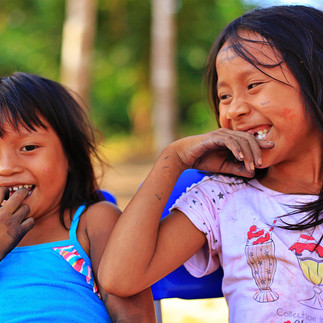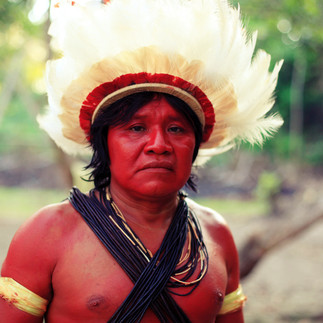As a filmmaker, living through the creative process is one of the most exhilarating experiences. I feel challenged, stimulated, frustrated, and satisfied. Of course, seeing our finished work of art launched into the world is a great accomplishment. However, the learning experience gained during the process becomes a valuable reference for the future.
In any audiovisual production, the research process is crucial. Preparing for production requires a comprehensive exploration of the subject. Unpredictable events are unavoidable, and the final product of any film production often reflects the successes, mistakes, predictions, and surprises encountered throughout the journey. It is the making of process that enables us to shape the product as it evolves while being produced.

The Zoró Pangyjej, an ethnic group of Brazil represented by the APIZ (The Zoró Indigenous People's Association), proposed sharing their ethnocultural knowledge and cultural customs with new generations. The event happened at the Zoró's reservation in the Northwest of the State of Mato Grosso and south of the State of Rondônia, in 2013.
I have never visited an indigenous land before. It requires special authorization and effort to make happen. Although I have always had great respect and empathy for indigenous causes, the idea of visiting a reservation or an isolated village was exciting and daunting. However, thanks to the APIZ, who hired me for audiovisual services, the trip happened without any problems. It was a unique and fulfilling experience that I will never forget.
The impact of being surrounded by an untouched Amazon forest is profound. Nature asserts itself in an enchanting and challenging way. We must be humble and respect nature and those who know the environment well.
When visiting an indigenous community, we must introduce ourselves and explain our intentions to its leaders. It allows them to feel comfortable with our presence and be aware of our plans. Foreigners in their midst can often be met with suspicion, so establishing clear communication is essential. Once everything is combined, they leave us free to fulfill our proposal while providing all the necessary support.
These are rare and unique experiences, especially for someone born and raised in an urban environment. Seeing and experiencing the world from the perspective of a vastly different Western European culture is a radical shift in mindset. It is impossible not to be confronted with the holders of these ancient cultures, whose wisdom sees the world from a completely different standpoint than ours. I caught a glimpse into their reality, which made me feel curious.
It was 5 am when the sound of morning chants awakened me. People were sweeping around the village. I heard someone chanting words in their native language, which I didn't understand. The Zoró's language is Tupi-Mondé, a branch of the Tupi language. Tupi originated from the Tupinambá language and was adopted as the General Language of Brazil by colonizers and missionaries.
Children were awakening to take their first bath in the river. In this particular village, the White River bathes the community. After breakfast, some women went to the fields to collect their crops and supervise plantations nearby. They also gathered firewood, bringing them back in a handmade basket. Other people cleaned the tribe, and I could get a good sense of the Zoró people's morning routine. It's nice to see how everyone moves harmoniously. There's no rush, no stress, and the day unfolds naturally.
I noticed something unique during my visit. The Zoró people have a tradition of eating together. Everyone sits in a circle, the food served at the center of a longhouse. They take turns to access the casserole or pot and select the dishes of their choice, which include fish broth, roasted cassava, fruits, meat, and other delicacies of the Zoró gastronomy. These are simple experiences among people in the community.
One day, a native man named Márcio invited me and a small group of people to eat a fish soup. He led us to a nearby tree and handed us a stew pot. Initially, we were not sure how we were going to serve ourselves. However, Márcio smiled and plucked a leaf from the tree beside us. He turned the leaf into a perfect utensil, and we realized we had a spoon. After the meal, we discarded the leaf, which left no residue and perfectly integrated with nature.
I have never seen such happy children before. Zoró's kids have bright eyes and genuine smiles. They spend most of their day playing and running around their village, enjoying the freedom many of us envy. They interact with animals, take a dip in the river, climb trees, and play together in a harmonious atmosphere that is truthfully uplifting. Their presence illuminates the entire day. However, they tend to show some distrust when someone approaches them with a camcorder. After socializing and flirting with them, they loosen up and allow interaction. What a joyful experience it is!
During my stay, I was impressed by another thing. I did not hear any single cry, expression of anger, sign of aggression, or yelling from anyone in the tribe. Neither the men nor the women were behaving aggressively. It made me wonder if their aggressive instincts channeled toward issues such as hunting and survival. In this tribe, maintaining a peaceful village did not come at the cost of inflicting harm. Of course, there could be disputes between them to be dealt with more intensely. But in their social life, I observed nothing of that sort, and the interactions were very peaceful.
The tribe members sleep in a large longhouse, where everyone rests in hammocks. They wake up early and go straight to the river to bathe. Afterward, they clean and maintain the tribe before having their meals. They tend to their crops in the woods and ensure the well-being of their family and elders. They also assist the surrounding community. As a group, they go on hunting trips for several days and share their experiences and lessons learned during a meeting at the end of the day. The tribe members have a strong sense of belonging and community that is evident in their daily activities.
Indigenous people have a unique and sacred relationship with the natural world based on respect and subsistence, unlike the destructive individualistic pursuits that have led to accumulation, wastage, and leftovers of modern society. The difference lies in the place their consciousness occupies, which fosters a direct relationship with the natural world. It makes their experience meaningful and sustainable, not just for themselves, but also for the planet.
Forest communities face a lot of struggles, and it's not just environmental challenges. There is an anthropological aspect to consider as well. Understanding and learning from our human experience while exchanging with other cultures is essential for our evolution and living harmoniously with nature.
Preserving ancient cultures and traditions can give us a unique perspective on life. It allows us to experience the world while preserving nature. This knowledge is passed down from generation to generation, and it may even be the key to maintaining human life on this planet in the future. Acknowledging the indigenous identity of the Mother of Brazil while embracing our ancestry can create a valuable sense of belonging to be shared and celebrated, ensuring the preservation of future generations.
Living a simple life in sync with the rhythms of nature, driven by basic needs for sustenance and human survival, is a concept that may seem obvious to those living in urban areas shocked by such direct interaction with nature. But this interaction is necessary for everything to function. Thus, we must celebrate, respect, and honor the ancestral knowledge of the Forest Peoples and their vital relationship with the natural world to protect them.
















































































♥️♥️♥️